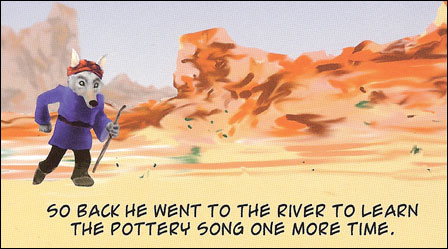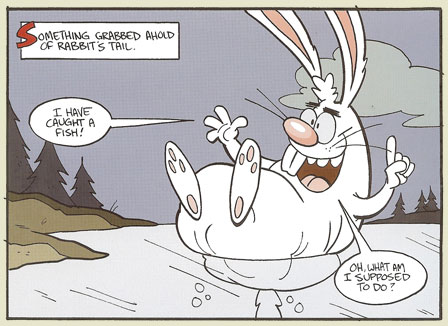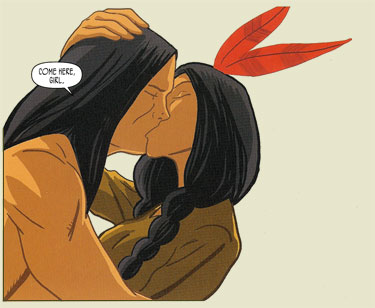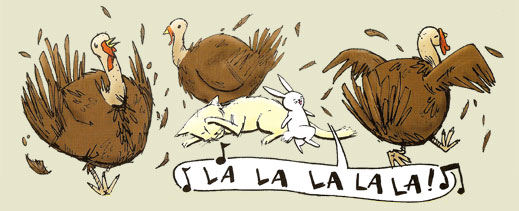Trickster
My acquaintance with North American tribal histories, lores, and mythologies is what those in the know might describe as inadequate. Woefully inadequate, even. Certainly I have for these cultures a passing appreciation that I garnered piecemeal from elementary school classes (focused on Californian tribes), a smattering of books, a couple of films, and even the occasional article. Knowledge thus gained is likely apocryphal and prone to stereotype—and so I've largely abandoned any sense that I understand North American tribal culture at all. I'm much more knowledgeable as concerns Olmecs, Toltecs, Aztecs, and Mayans than I am of Cherokees, Apaches, Utes, or Choctaws. And my entire knowledge of Canadian tribal nations comes from an Elmore Leonard novel and Jim Jarmusch's Dead Man, neither of which are satisfactory sources.

So when the opportunity to read an anthology composed wholly by tribal Americans and trafficking entirely in tales drawn from the tribal mythos, I was demonstrably excited. I had grabbed seven books that day and this collection was the first I picked up. It was also, of those seven books, the last finished—and finished reluctantly.
Trickster was, by all measures available to me, a bitter pill to swallow.

I frequently remark at the necessarily uneven tone of anthologies, with one story trumping another and the next falling far short of the bar set by the former. I expected this. What I hadn't expected was for the bar to be set so low and for it to remain low for the book's duration. These stories were almost* universally uninvolving and trite, offering no compelling reason to read further. It was only a personal need to perform my due diligence that pressed me to continue. Never a good recommendation for a book.
Almost exclusively, the writing in the book was limp. These stories of the Trickster (usually a coyote or rabbit or raccoon) were simply uninteresting. Perhaps they make a better oral tradition than a written one, but my feeling is that almost any of the stories could have been made more compelling with a steadier author's hand. Many of the tales take forms similar to Kipling's Just So Stories. How the alligator got his skin, how the rabbit got his tail, how the raccoon got short and fat, how the beaver stopped being an unbridled killing machine, et cetera. There's meat there for some decent stories. Or at least some lame stories told interestingly. But it just never coalesces.

And while very rarely all that good, there are times when the art is actually just plain bad. After several stories with lackluster art, I gave up entirely on hoping for good visual storytelling and merely crossed my fingers, hoping that it wouldn't get worse. The inhabitants of the frame often looked like creatures in static poses, only rendered so still from the steady hand of some demented taxidermist. It was rare that I felt an artist had a good feel for the story being told.
Probably the greatest tragedy is the squandered opportunity. I was a happy and willing student, ready to take on a culture decidedly foreign from my own. I came to Trickster with a thirst for being inducted into terra incognita. And here I stand, as much a foreigner as I was three weeks ago when I first opened the book. Heck, I may even be more of a foreigner now.
I don't know what to feel. Should I see Trickster as well-representative of the North American tribal folklore? If so, then what am I to make of that culture? I found the storytelling infantile and the artistry remedial. Am I then too quick to judge another culture by standards I have learned under the rigours of my own? If so, that would be deeply unfair, like judging the first novels to come out of Borneo by the standards to which we would hold the latest literary release from Knopf. I don't want to be that person and yet: if Trickster is a fair representation of the North American tribal narrative art, I can honestly say that I'm not all that interested in sitting around, waiting for it to develop into something I can appreciate.
Not that a culture's goal is to develop into something I can appreciate, of course.

My real hope is that Trickster is not a good reflection of the stories of these cultures.** That it is, rather, simply the product of those who were willing to put pen to paper in the particular form required by the medium. Perhaps tribal culture generally views the comics form as infantile as most Americans did until (mainly) this last decade. Maybe there are great storytellers among the peoples and nations who can turn the legends into verdant tales, both relevant and riveting. Perhaps those people exist and were merely not interested in a medium that doesn't get half the respect it often deserves. That is my deep and solemn hope.
Because I would hate to judge cultures based on this one hollow product.

Notes:
*Hm. I suppose I should note that I did enjoy two stories in the volume. The best of show were the story about the raven kicking sea anemones and the one about how the wildcat caught a turkey. Both were enjoyable, with fair art—the wildcat story's art bore strong resemblance to Doug TenNapel's. Still, these were two stories out of twenty-one and there's a long stretch between the two tales.**With the very traditionally Americano cartoon styles employed by the artists, it's easy to become hopeful that this work isn't really representative of Native American culture at all. Or at least not representative of the best of it.
Good Ok Bad features reviews of comics, graphic novels, manga, et cetera using a rare and auspicious three-star rating system. Point systems are notoriously fiddly, so here it's been pared down to three simple possibilities:
3 Stars = Good
2 Stars = Ok
1 Star = Bad
I am Seth T. Hahne and these are my reviews.
Browse Reviews By
Other Features
- Best Books of the Year:
- Top 50 of 2024
- Top 50 of 2023
- Top 100 of 2020-22
- Top 75 of 2019
- Top 50 of 2018
- Top 75 of 2017
- Top 75 of 2016
- Top 75 of 2015
- Top 75 of 2014
- Top 35 of 2013
- Top 25 of 2012
- Top 10 of 2011
- Popular Sections:
- All-Time Top 500
- All the Boardgames I've Played
- All the Anime Series I've Seen
- All the Animated Films I've Seen
- Top 75 by Female Creators
- Kids Recommendations
- What I Read: A Reading Log
- Other Features:
- Bookclub Study Guides











